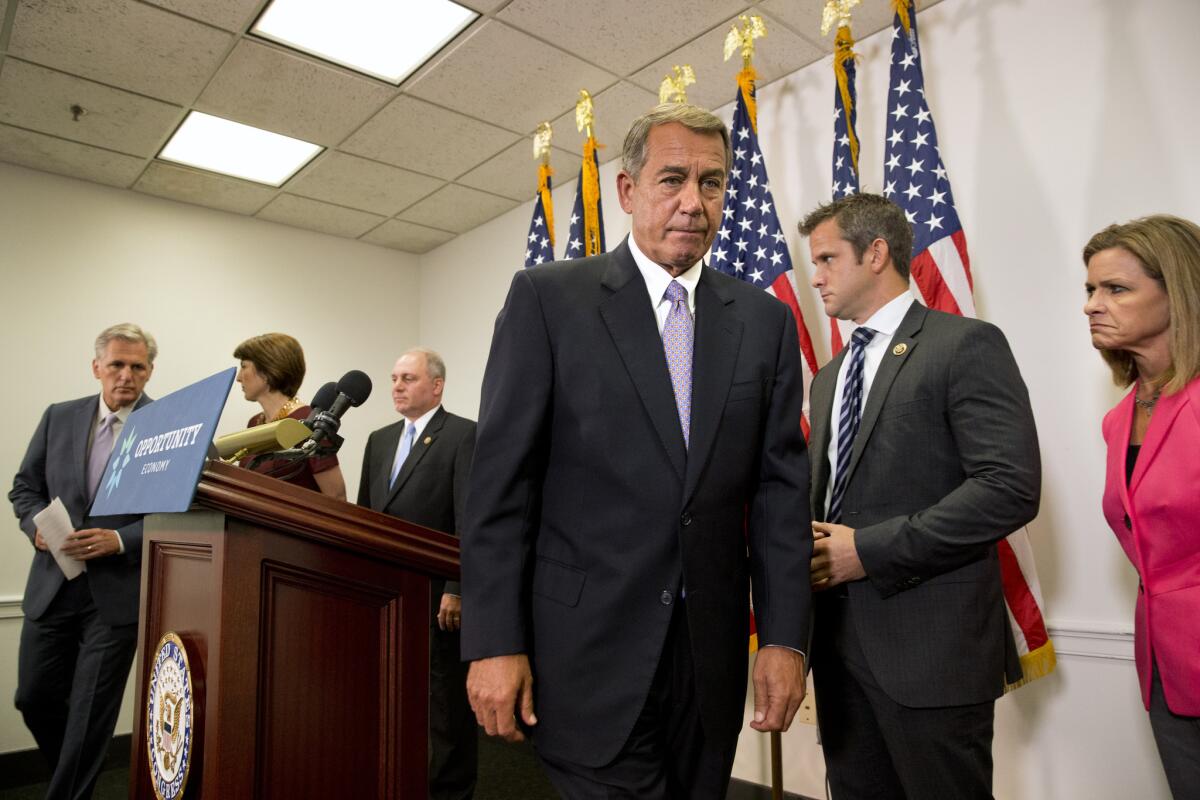Uproar among House GOP conservatives forces new strategy on Iran vote

Speaker of the House John Boehner of Ohio leaves the lectern after speaking about his opposition to the Iran deal at a news conference with members of the House Republican leadership in Washington.
- Share via
Reporting from Washington — Republican hopes of forcing President Obama into a veto showdown over the Iran nuclear deal collapsed Wednesday after House conservatives forced leaders to ditch their strategy and come up with a new one.
Republicans overwhelmingly oppose the landmark agreement. But a core group of House Republicans surprised leaders by announcing they would not join colleagues in voting for a resolution of disapproval against the deal. The move marked another major setback for Speaker John A. Boehner.
Meeting over dinner the night before at a favorite Mexican restaurant known as a staging ground for past Republican rebellions, the conservative Republicans were upset that Senate Democrats had built a firewall of support for the president, meaning that even if the House approved the disapproval resolution, it probably would not advance out of the Senate.
Other Republicans expressed similar concerns at a morning meeting that left Boehner and his leadership team with few options. Without support from his ranks, Boehner was forced Tuesday to call off a procedural vote for the disapproval resolution.
Instead, House Republicans are preparing to vote Thursday and Friday on a trio of largely symbolic bills to show their opposition to the landmark deal.
One vote will be a resolution of approval, which will almost certainly fail. The others will prevent the lifting of sanctions on Iran and express the sense of Congress that the full details of the deal were not released.
Although the new strategy gives Republicans a different way to express their opposition to the Iran deal, none of the new bills have much chance of altering the outcome.
“We’re just trying to do some bank shots,” said Rep. Dave Brat (R-Va.), after he joined GOP presidential candidates Donald Trump and Sen. Ted Cruz (R-Texas) at a rally against the deal on the Capitol steps.
Congress gave itself until Sept. 17 to act on the agreement, which the United States and five other nations reached with Iran to limit its nuclear weapons capabilities in return for a lifting of economic sanctions. Britain, France, Germany, China and Russia are aligned with Obama on the deal.
Only the sanctions measure could offer any possible resistance to the deal, but even if that bill passes the House this week, it would face a short timetable for action in the Senate. If it were able to clear Congress, the president would probably veto it.
Tuesday’s skirmish in the House blindsided Republican leaders on both sides of the Capitol and left the GOP in the familiar position of allowing party infighting to doom its plans.
Conservative Republicans, including Cruz and other senators, encouraged the renegade effort, upset that the administration did not fully release what they call the “secret side deals” to the agreement between Iran and the International Atomic Energy Agency regarding inspections. The push had backing from outside groups, including the conservative Heritage Action.
Republicans claimed the White House has not fully complied with the terms of the congressionally approved review and therefore they did not want to legitimize the deal with their vote of disapproval. They said denying the deal’s approval made more sense.
The drama in the House unfolded as it became increasingly clear the Senate GOP did not have enough votes to send the disapproval resolution to the president’s desk.
Obama had vowed to veto the resolution anyway, but the support of 42 senators aligned with Democrats meant they could filibuster and prevent it from ever reaching the president’s desk. Republicans need 60 votes to overcome the filibuster but have only 58 -- all Republicans with four Democrats.
“We are deeply impressed,” said Secretary of State John F. Kerry about the show of support.
Late Wednesday Senate Majority Leader Mitch McConnell (R-Ky.) took procedural steps for a vote on the disapproval vote in the Senate. That could come as soon as Thursday. It was unclear if he would then shift to the House GOP’s new strategy.
For the latest from Congress and the 2016 campaign, follow @LisaMascaro.
More to Read
Sign up for Essential California
The most important California stories and recommendations in your inbox every morning.
You may occasionally receive promotional content from the Los Angeles Times.














